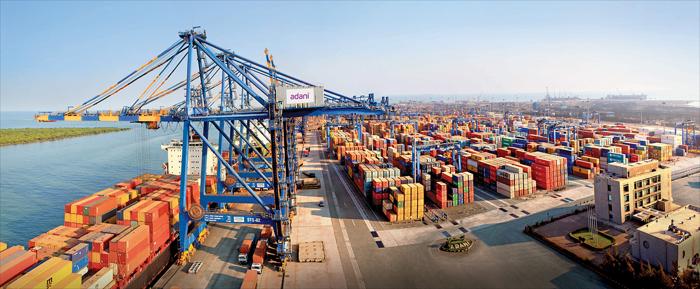Adani’s Mundra Port continues to expand Indian container trade market share
Competition between government/landlord ports and Adani Ports and Special Economic Zone (APSEZ) in India is heating up, with the latter making rapid inroads into the emerging market.
Adani Group’s flagship Mundra Port boosted its market share of Indian containerised trade to 34% last fiscal year (2023-24), from 31% year-over-year, according to exclusive data obtained by Container News. Mundra competes with Nhava Sheva Port for north-western cargo, which makes up the bulk of Indian box volumes.
To amplify the growth pace for Adani, Mundra has seen container volumes increase from 2.7 million TEUs in 2014-15 to 7.4 million TEUs in 2023-24, registering a compound annual growth rate (CAGR) of 12%.
On the other hand, Nhava Sheva Port (JNPT) has expanded volumes at a significantly slower rate -– from 4.5 million TEUs to 6.4 million TEUs, a CAGR of 4%, data shows.
That phenomenal growth for Mundra comes despite its high tariff rates. Mundra’s vessel and-container-related charges are substantially higher than those at the leading terminals in Nhava Sheva, according to anecdotal data.
According to local industry voices, greater efficiency and stronger hinterland cargo advantages are driving Mundra's growth journey.
Additionally, Adani’s strategic terminal partnerships with liner giants CMA CGM and MSC yields significant volume gains for Mundra. The port saw 1.7 million TEUs of transshipment cargo-handling in fiscal 2023-24.
Steady cargo shifts away from government ports could threaten volume targets for India’s older build-operate-transfer (BOT) terminal operators, who have concessions that mandate high royalty share obligations towards their landlord port entities.
“Clearly, the company’s business model of end-to-end service, strategic partnership with key customers, leveraging the network effect through its string of ports, and focus on operational efficiencies is yielding results,” said Ashwani Gupta, whole-time director and CEO at APSEZ in a recent statement.
He further said: “We continue to invest heavily in the business to drive growth, particularly in the logistics segment.”
Gupta went on to add: “Our newly launched trucking segment enables APSEZ to provide the last-mile connectivity solution to its customers. Our efforts towards sustainable business growth are well recognized in the top decile ESG rating from four global rating agencies.”
APSEZ is also betting high on its new container transhipment terminal at Vizhinjam Port in southern India. The terminal recently kicked off trial operations, ahead of its official launch shortly.
“Once we complete the automation and the Vessel Traffic Management System, Vizhinjam will be in a class of its own as one of the most technologically sophisticated transshipment ports in the world," APSEZ managing director Karan Adani noted.
"No other port in India - including our own highly advanced Mundra Port - has these technologies,” he added.

